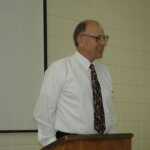Missouri DNR representatives visit Nevada

By Steve Moyer
Nevada Daily Mail
Doyle Childers, the director of the Missouri Department of Natural Resources, stopped off at the Nevada Community Center Tuesday afternoon and discussed changes the DNR has undergone in the past year to make it easier for businesses and municipalities to submit applications for permits and to make the permit process more transparent to applicants.
Childers, a former science teacher and member of the Missouri Legislature, said when he came in as director of the DNR he considered how to make the department more effective.
"One of the questions I asked was how can we make the paperwork simpler," Childers said. "How can we prevent pollution and give the people better service. We decided to work with people and be more cooperative. The paper permitting process was about as efficient as it could be without hiring more people and you couldn't do that so we put more of the work on the Web, and put many of the forms on the site and made them fill in the blank type. We looked at the Web site and it was not user friendly, you had to know how the department worked to find anything. We changed it so that someone who doesn't know every detail about the department can find the information they need, now it's a lot of good information and it's easier to find."
One of the reasons for the change was the fact that people were submitting applications that were no longer current.
"People were working with obsolete paperwork from '97, '98 and '99, and the laws have changed since then and the paperwork would need to be redone," Childers said. "The forms on the Web site can be filled out online, saved and you can come back to them."
Another change in the department is the use of ombudsmen to help people navigate the department.
"These are not your typical ombudsmen," Childers said. "I told everyone we did not want technical people as ombudsmen, we have enough technical people, we needed someone who was a good communicator and could work with the people who needed help."
Childers said the DNR could help people prevent delays if they consulted with the department early in the planning stages instead of waiting for the start of a project to submit information.
"One of the problems I'm encountering is that people are coming in late in the process and we'd like them to come in to us first," Childers said. "We've had people come in and have been pretty far along, some have even broken ground on projects before seeking permits from us and we've had to tell them they couldn't do something, sometimes because of federal law or similar problems."
Childers is also decentralizing the department and putting more people in offices located throughout the state.
"We've concentrated on getting our people out into district and satellite offices," Childers said. "That saves travel time. We've found that if we went to a site that had a three- or four-hour drive to the site it was a tremendous waste of time but at the same time if we waited to get several sites to inspect in the same area we weren't responding in a timely manner. By locating the offices near the sites needing inspection it's more efficient."
Childers also looked at municipalities and businesses that had not been contacted in a prolonged time to see if they were in compliance.
"We looked at 188 permittees that hadn't had contact in awhile and found 55 percent were perfect and had no problems but 45 percent had some problems. We worked with them and sent people out to help them get into compliance and 100 percent were able to get into compliance and we didn't have to issue any citations."
Childers answered several questions from the audience that included one from a man who questioned why the department didn't seem to respond to complaints from rural areas.
"It looks like if you live in Carthage and you have an odor problem you get help," the man said. "But if you live where I do and you have a problem you don't get any help. The odor from Murphy hog farms can curl your eyeballs and is as big a problem as one they have in the city."
Childers responded that all complaints are taken seriously but the offices are located where they can take care of the most sites effectively, it didn't mean that problems further away from an office were ignored.
After the questions Childers assistant reminded him that they still had to travel to other locations for meetings there.
